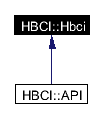
#include <hbci.h>
Inheritance diagram for HBCI::Hbci:

Public Methods | |
| Hbci (bool readonly=false, bool retrievalOnly=false) | |
| virtual | ~Hbci () |
User Interaction | |
| Pointer< Auth > | authentificator () const |
| void | setAuthentificator (Pointer< Auth > a) |
| Pointer< Interactor > | interactor () const |
| void | setInteractor (Pointer< Interactor > i) |
HBCI configuration | |
| bool | isReadOnly () const |
| bool | isRetrievalOnly () const |
System identification | |
| const string & | systemName () const |
| void | setSystemName (const string &n) |
| const string & | systemVersion () const |
| void | setSystemVersion (const string &s) |
Static Public Methods | |
Version Information | |
| void | libraryVersion (int &major, int &minor, int &patchlevel) |
| void | libraryVersion (int &major, int &minor, int &patchlevel, int &build) |
| DLLIMPORT int | debugLevel () |
| DLLIMPORT void | setDebugLevel (int l) |
This is the central user interaction class for all HBCI connections through OpenHBCI. You need exactly one object of this class when you use OpenHBCI.
This class contains objects for user-interaction (Interactor, Auth), system version and name, and the configuration mode flags for OpenHBCI (readonly, retrievalonly).
|
||||||||||||
|
Constructor.
|
|
|
Default Destructor. |
|
|
Returns the Auth currently to be used.
This returns a pointer to an object which can be used for authentification. This is used by the media to ask for the pin. When creating the HBCI-object this one gets a new authentificator assigned (Auth). As you can see this is a perfect example of the value of Pointer. When assigning a new Auth object you don't have to care whether already is one and how it was created. Simply do a |
|
|
Returns the current debugLevel. The higher this value the more debug messages you see. Default is zero. |
|
|
Returns the HBCIInteractor currently to be used. |
|
|
Returns true if OpenHBCI is in read-only mode. Returns true if OpenHBCI is in read-only mode, i.e. no jobs are allowed which actually do something with your account at the bank. (e.g. JobSingleTransfer)
|
|
|
Returns true if OpenHBCI is in retrieval-only mode. Returns true if OpenHBCI is in retrieval-only mode, i.e. OpenHBCI will only store the minimum of data per account required for subsequent retrieval of account data. I.e. it will not store the balance, transactions, and standing orders of an account. |
|
||||||||||||||||||||
|
Gives you the library version. Gives you the library version. This might be used by your application to determine the capabilities of the current openHBCI version.
|
|
||||||||||||||||
|
Gives you the library version. Gives you the library version. This might be used by your application to determine the capabilities of the current openHBCI version.
|
|
|
Set a new HBCIAuth to be used. |
|
|
Set the current debugLevel. The higher this value the more debug messages you see. Defaults to zero. |
|
|
Set a new Interactor to be used. The Interactor is a base class that provides methods for all occasions where the core OpenHBCI needs user interaction. |
|
|
Set the system name. Use this to define the system name. It defaults to HBCI_SYSTEM_NAME which is probably set to "openhbci". |
|
|
Set the system version string. Use this to define the system version. It defaults to HBCI_SYSTEM_VERSION. |
|
|
Returns the system name. This is the system name that OpenHBCI tells the bank. |
|
|
Returns the system version as a string. This is the system version that OpenHBCI tells the bank when communicating. |
 1.2.17
1.2.17